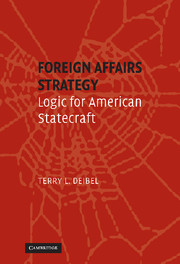Book contents
- Frontmatter
- Contents
- Preface and Acknowledgments
- 1 Introduction: Defining Strategy
- PART I ASSESS
- PART II ANALYZE
- PART III PLAN
- 6 The Instruments of State Power
- 7 Linking Ends and Means
- 8 Evaluating Courses of Action
- 9 Conclusion: American Foreign Affairs Strategy Today
- APPENDIX A Definitions of Grand Strategy, National Security Strategy, and Statecraft
- APPENDIX B A Linear Design for Foreign Affairs Strategy
- Index
9 - Conclusion: American Foreign Affairs Strategy Today
Published online by Cambridge University Press: 05 June 2014
- Frontmatter
- Contents
- Preface and Acknowledgments
- 1 Introduction: Defining Strategy
- PART I ASSESS
- PART II ANALYZE
- PART III PLAN
- 6 The Instruments of State Power
- 7 Linking Ends and Means
- 8 Evaluating Courses of Action
- 9 Conclusion: American Foreign Affairs Strategy Today
- APPENDIX A Definitions of Grand Strategy, National Security Strategy, and Statecraft
- APPENDIX B A Linear Design for Foreign Affairs Strategy
- Index
Summary
Despite the many illustrative examples found throughout its pages, the emphasis in this book has been on how to think strategically about foreign affairs, not what to think about American foreign policy. Those who would succeed in foreign policy have been advised to begin with a clear conception of the national interest based on the nation's values, and then to scan the international environment for threats to those interests and opportunities for advancing them, while carefully checking their assumptions about how the world works against reality. They have been urged to think carefully also about the means available to them from the domestic context, including both material resources and public support, and to consider shrewdly what influence they may garner, both with the targets of their strategies and with third parties who may affect their success. They have been counseled to choose objectives that are both desirable and feasible, to marry them with instruments suitable for their achievement, and to select ways of using those instruments that will render their statecraft efficient and effective at reasonable cost and risk. In short, it has been argued that success in foreign policy begins with a sound foreign affairs strategy, strategy that must then be implemented through the policy process.
Such advice does not, of course, by itself a strategist make. Here there is no substitute for practice, for just as one cannot apply the concepts in strategic logic successfully without understanding them, so one cannot understand those concepts fully without applying them to the real world and using them to discipline one's thinking.
- Type
- Chapter
- Information
- Foreign Affairs StrategyLogic for American Statecraft, pp. 366 - 414Publisher: Cambridge University PressPrint publication year: 2007



